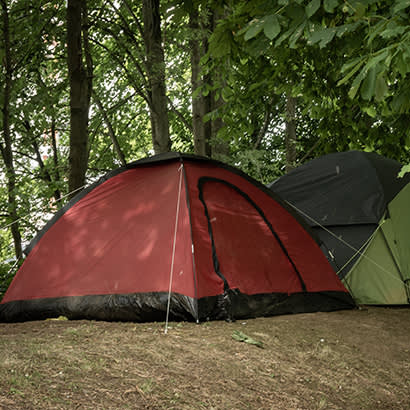
For an enhanced digital experience, read this story in the ezine.
Navigating the intersection of parks and housing
When Memphis (Tennessee) Parks revived its park ranger program in June of 2021, the goal was to increase safety in the parks and improve in-person communication with park users. Helping to facilitate housing opportunities and other critical social resources was not necessarily part of the plan, but with meaningful partnerships, Memphis park rangers continue to make an impact.
Reports from the first weeks of park rangers in action showed the most frequent calls to be issues of parking violations, off-leash pets and minor maintenance repairs. As the new rangers became more familiar with their park areas, they also became more familiar with regular park users. Many of the rangers took notice that some park users were camping in the park long term. In the past, park users would interact in passing with park maintenance staff. The ranger role was built for interaction, and the dynamic between park users and parks staff started to shift. Over time, the park rangers began to connect with park users, chatting on their regular visits and sometimes stopping in multiple times a week if weather conditions were not ideal. These relationships also made relocation requests possible. For example, a ranger may need to request a park user not to camp in a pavilion or to vacate while a park amenity was under construction. While these requests were not always met with ease, the growing visibility of the park rangers coupled with the interpersonal interactions helped many rangers reach their desired outcome. As relationships grew, it became apparent that campers in Memphis Parks needed resources that park rangers could not easily provide or even advise on.
A Change in State Law
As Memphis continued to grow its park ranger program, new laws addressing homelessness in public spaces started to rumble in the Tennessee legislature. On July 1, 2022, Tennessee became the first state to make it a felony offense to camp on any public property. Violators could face up to six years in prison and the loss of voting rights. In the face of serious consequences for some of the most vulnerable park users, the Memphis Parks team went to work outlining their local park and recreation response.
Responding With Policy and Partnership
To reduce the risk for implicit bias and inconsistent practice, Memphis Parks adopted a policy and procedure for addressing campers in parks as a reference point for staff in the field. The procedures included the purpose statement, “All Memphis Parks properties are open for public use by all Memphians. Memphis Parks does not make selections about who may or may not use a park based on race, ethnicity, sex, gender, age, ability, or housing status.” This statement guides Memphis Parks staff on their actions around a new state law, as well as the agency’s overall philosophy that every Memphian belongs in their parks.
While policy helped address the issue from an administrative standpoint, the reality for park rangers on the ground was that a hands-on resource was needed. To fill this gap, Memphis Parks called on the local nonprofit Hospitality Hub. This organization connects individuals with resources they need to begin their journey out of homelessness. In August 2022, Hospitality Hub opened its doors to park rangers, led training and gave a full explanation of their effective outreach process. Park rangers walked out with a daytime hotline number. When a park ranger makes the call, the Hospitality Hub sends an outreach specialist to any of Memphis’ more than 160 parks.
More than 18 months have passed since camping in Tennessee parks became a felony offense. To date, no arrests for camping have been made in Memphis parks. However, at least 36 park users have been connected with the Hospitality Hub.
Park and recreation professionals may be the keepers of the civic commons, but we cannot solve every challenge in our parks alone. Seek partnerships intentionally and be open to the park and recreation professional’s role in each challenge you face.
Amy Collier, CPRP, is Development Manager at Memphis Parks.

